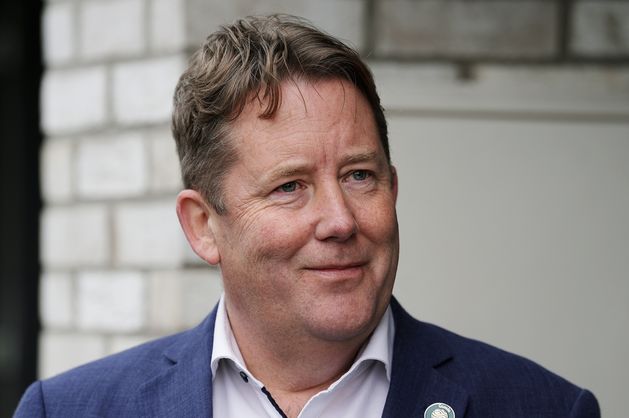Figures provided to Sinn Féin’s Lynn Boylan by Energy Minister Darragh O’Brien show 301,000 households are in arrears
Figures obtained by Sinn Féin MEP Lynn Boylan show 301,000 households were in arrears on their electricity bills in May. Ms Boylan said this was a record.
Another 175,000 domestic gas customers are behind on their bills.
Small firms are also struggling to keep up to date with their bills. A total of 27,400 small firms were in arrears on their electricity bills in May, according to the figures provided to Ms Boylan by Energy Minister Darragh O’Brien.

Energy Minister Darragh O’Brien. Photo: PA
Today’s News in 90 Seconds – Thursday July 31
Ms Boylan said food-price inflation meant families were being forced to prioritise buying groceries over paying their energy bills on time.
The number in arrears on electricity bills was up 64,000 on the total for April, according to calculations based on figures from the Commission for the Regulation of Utilities (CRU).
“This is the highest number of households in arrears ever, at 301,379. The previous high was April 2025, at 300,653,” Ms Boylan said.
The Government will pretend like this is all outside their control, but it’s not
Last week, Flogas announced a 7pc hike in its electricity prices from next month, with more suppliers expected to follow. SSE Airtricity has already announced price rises.
.jpg)
Sinn Féin MEP Lynn Boylan
The CRU said network charges for households would be going up, but it has also emerged they are going down for data centres.
“While families struggle, energy suppliers like Flogas continue to jack up energy prices while also raking in eye-watering profits,” Ms Boylan said.
Flogas does not report profits directly, but its parent company, DCC plc, recorded profits of €714m in the year to March.
“The Government will pretend like this is all outside their control, but it’s not,” Ms Boylan said, adding that the CRU was preparing to increase household network charges and cut them for data centres.
It remains far too high for households
She said t he Government could easily intervene to prevent that, as happened in 2009 with the Large Energy User Rebalancing Subvention.
“The same goes with the PSO [Public Service Obligation] Levy. It might be coming down slightly, but it remains far too high for households,” she said.
Ms Boylan also said households were shouldering a disproportionate amount compared with data centres.
Last week, Flogas said its electricity prices would go up by 7pc from August 25. Standing charges and unit rates will both rise. For a typical residential electricity customer, this will mean an increase of around €126 per year, or €10.51 a month. There is no change to its domestic gas prices.
Flogas blamed its price hike on the decision by the CRU to increase network charges.
The CRU increased network charges by €100 on the average annual bill this year, with much of the money raised from this to be used for investment in infrastructure.
Daragh Cassidy, of price-comparison site Bonkers.ie, said more suppliers will probably increase their prices.
He said wholesale energy prices had decreased since the height of the energy crisis in 2022, but costs for the upkeep of the electricity grid kept rising.

